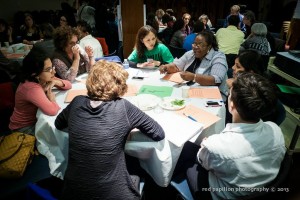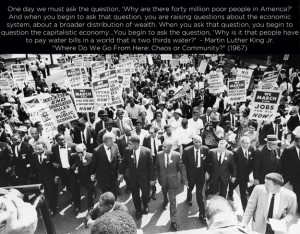Honoring King, Fighting Fear: Why Economic Justice Must Matter to All Who Care About Racial Justice
The room is completely full: the 90 chairs set out are filled; people stand leaning against walls and columns. Each table seats a combination of Jewish seniors, their family members, and homecare workers from the Filipina, Nepali, Latina, and Caribbean communities.
At the center of the room sits a circle of eight people. All eyes are on them. They are telling stories about death, about the moment when a person who they supported in life passed away. For some, a spouse or a parent. For others, an employer. One woman talks about the moment her employer of many years, an 86-year-old man, died in her arms. Crying, she tells the room about her profound honor in helping her dear employer move gracefully out of this life. Translators provide simultaneous interpretation.
The next speaker talks through her shame, describing the last days of her mother’s life, how when she moved her mother into a hospital, she discontinued all communication with her mother’s live-in homecare attendant, even when the worker tried to find out where she could visit her former patient. The speaker hadn’t realized, she said, the depth of the relationship that forms between an elder and the person who supports them most intimately in those final years of life.
The room breathes a collective sigh as the speakers take a break. At the tables, seniors and their family members admit the isolation they’ve been feeling, and their fearfulness about who will be there for them or their parents at the end. Homecare workers see themselves in these stories, and reflect on their own fears, both for their employment and their own aging and end-of-life care.

Seniors, their family members, and domestic workers discuss difficult topics and envision change to a system that pits seniors and domestic workers against each other.
This is no typical community organizing meeting. It’s an Eldercare Dialogue held last month at Congregation B’nai Jeshurun on Manhattan’s Upper West Side, a project (organized in part by my organization, Jews for Racial & Economic Justice) to transform the homecare industry of New York. It brings together seniors, their family members, and domestic workers to discuss difficult topics connected to homecare, share their universal desires for dignity and respect, and envision change to a system that pits seniors and domestic workers against each other in an economic zero-sum game.
A Revolution of Values
This campaign is part of a transformative racial justice movement that makes clear the systemic links between racial injustice and economic injustice in our country. Dr. Martin Luther King Jr. always made the connection between the two. In May 1967, King powerfully said:
We must recognize that we can’t solve our problem now until there is a radical redistribution of economic and political power … this means a revolution of values.
Today more than ever, racial justice means economic justice. Fighting for racial justice means rebuilding the social safety net, passing just and comprehensive immigration reform, and changing relationships in some of the country’s most exploitative industries.
There is a deep commitment in the American Jewish community toward ending racial injustice in our country. Jews have a long and proud history of fighting against racial discrimination in its many forms from the civil rights movement through today. As a whole, however, the American Jewish community does not share the same commitment to an overhaul of the economic systems of our country and “the radical redistribution of economic power” King advocated.
What gets in our way?
In many cases, we are guided by unconscious fear. Fear prevents far too many from taking the step from fighting against racial injustice to fighting for economic justice. Many Jews today with economic power are only a generation or two removed from poverty. The impermanency of financial stability looms large in our collective history. Indeed, family and community memories of fleeing without our belongings, of having our resources seized, or of falling under a violent communist regime still figure in our experiences today. With this collective sense of economic and physical instability, we cling to our resources ever more tightly. Talk of a radical redistribution of economic power can feel like a threat to our sense of safety, and can make us suspicious of our neighbors.
It is time that we leave this fear behind and replace it with a deep sense of interconnectedness and collective financial and physical safety. Indeed, studies have proven that communities are safer and healthier when less divided by extreme inequality. Over the last year, the Eldercare Dialogues — part of Caring Across Generations — have brought together Jewish seniors and mainly immigrant domestic workers to transform the homecare industry toward real economic stability for both aging seniors and homecare workers. Working toward economic justice for members of all of our communities will demand a revolution of values. But it is a revolution that can bring needed healing and transformation to the Jewish community.
It is time that the American Jewish community commits ourselves as forcefully to economic justice as we have to racial justice. It is time for our own “revolution of values.”
Marjorie Dove Kent is the Executive Director of Jews for Racial & Economic Justice, one of the leaders of Caring Across Generations’ Eldercare Dialogue Project. Before coming to JFREJ in 2011, Marjorie worked as an organizer for the Massachusetts Affordable Housing Alliance, for the Boston Workman’s Circle, and as a neighborhood organizer in St. Louis. She is a graduate of the Hebrew College Me’ah Program in Jewish Learning, the Jewish Organizing Initiative Fellowship, and the Jewish Social Justice Workers learning circle.
![[the current issue of ZEEK]](../../image/2/100/0/5/uploads/leftistethicistgraphic-52842c6a.png)
- 5000 Pages of Zeek
- Founded in 2001, Zeek was the first Jewish online magazine, and we have over 5000 pages online to prove it, all available free of charge. Read more in the Archive.
More articles by
Marjorie Dove Kent
More articles in


